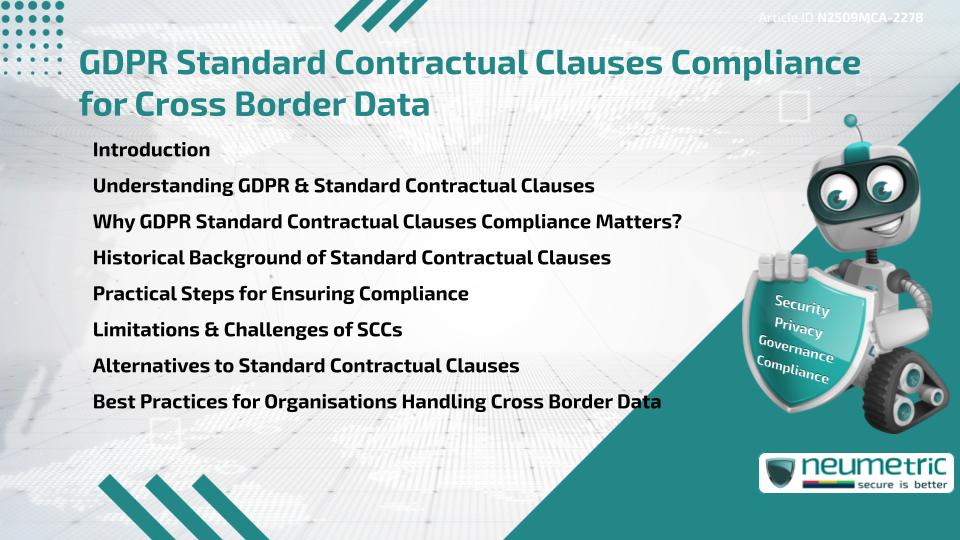Table of Contents
ToggleIntroduction
The General Data Protection Regulation [GDPR] established strict rules to safeguard Personal Data leaving the European Union. One of the primary legal mechanisms for cross border transfers is the use of Standard Contractual Clauses [SCCs]. GDPR Standard Contractual Clauses Compliance ensures that organisations moving data outside the European Economic Area uphold EU Privacy standards. This article explains the significance of SCCs, their historical development, practical steps for Compliance, limitations & Best Practices for Organisations engaged in global data flows.
Understanding GDPR & Standard Contractual Clauses
The GDPR is designed to protect Personal Data by imposing strict Accountability & Transparency requirements. When data is transferred outside the EU, Risks of misuse & weaker protections increase. SCCs are pre-approved contractual terms that bind the sender & recipient of data to EU-equivalent safeguards. In practice, these clauses operate as a bridge, ensuring individuals’ rights remain intact regardless of where their information travels.
Why GDPR Standard Contractual Clauses Compliance Matters?
Compliance with SCCs is critical because failure to meet requirements may result in significant fines & reputational harm. The GDPR allows penalties of up to four percent (4%) of global turnover for breaches. Beyond legal exposure, non-Compliance can undermine Customer Trust & obstruct Global operations. For Organisations engaged in international trade, SCCs act as both a legal shield & a business enabler.
Historical Background of Standard Contractual Clauses
SCCs have existed since the early 2000s, originally drafted under the Data Protection Directive. After the introduction of GDPR in 2018, the European Commission updated the clauses to align with stricter standards. In 2021, the Commission released modernised SCCs, addressing cloud services, complex data chains & accountability requirements. These updates reflect the evolving reality of global digital services & the need for stronger protections in light of challenges like the invalidation of the EU-US Privacy Shield.
Practical Steps for Ensuring Compliance
To achieve GDPR Standard Contractual Clauses Compliance, Organisations must take structured actions:
- Conduct transfer impact assessments to evaluate Risks in the recipient country.
- Implement technical safeguards like Encryption & Pseudonymisation.
- Update contracts with the latest SCC templates published by the European Commission.
- Train Employees handling cross border data on obligations & rights under GDPR.
- Monitor third parties continuously for Compliance with the agreed clauses.
Limitations & Challenges of SCCs
While SCCs provide a legal Framework, they are not without challenges. Organisations remain responsible for verifying that foreign jurisdictions do not compromise the protection level guaranteed under GDPR. This often requires complex legal assessments & supplementary measures. Moreover, SCCs can be burdensome for smaller businesses lacking resources to implement extensive safeguards. Critics argue that they shift too much responsibility onto Organisations without addressing systemic issues in recipient countries.
Alternatives to Standard Contractual Clauses
SCCs are not the only mechanism for lawful transfers. Other options include Binding Corporate Rules [BCRs] for multinational groups, adequacy decisions where the European Commission recognises foreign countries as having equivalent protections or derogations for specific cases. However, these alternatives have limitations in terms of scope, cost or availability. Therefore, SCCs remain the most widely used mechanism for cross border transfers.
Best Practices for Organisations Handling Cross Border Data
Organisations can strengthen Compliance by embedding Privacy into their overall data Governance strategy. Recommended practices include:
- Regularly auditing data flows to ensure accuracy.
- Engaging legal experts to interpret jurisdictional Risks.
- Applying data minimisation principles to limit unnecessary transfers.
- Using secure contractual management systems to track SCCs across Vendors.
These proactive measures create a culture of Accountability & Resilience.
Takeaways
- SCCs are a primary Legal tool for Cross Border data transfers under GDPR.
- Compliance ensures protection of Personal Data & avoids Regulatory penalties.
- Organisations must perform Transfer Impact Assessments & apply Safeguards.
- SCCs have limitations & require supplementary measures in some cases.
- Best practices include Audits, Training, Data minimisation & secure Contract Management.
FAQ
What are Standard Contractual Clauses under GDPR?
Standard Contractual Clauses are sets of contractual terms approved by the European Commission to protect Personal Data transferred outside the EU.
Why is GDPR Standard Contractual Clauses Compliance important?
It ensures that Organisations meet GDPR obligations when moving data abroad, protecting both individuals & companies from Risks.
Are SCCs enough on their own for Compliance?
No, Organisations must also assess local laws, apply technical safeguards & ensure actual enforcement of contractual obligations.
How often should SCCs be updated?
They should be updated whenever the European Commission issues new templates or when organisational data flows change significantly.
Can Small Businesses use SCCs?
Yes, but they may face resource challenges. Simplified training & external legal advice can help Small Businesses remain compliant.
What is the difference between SCCs & Binding Corporate Rules?
SCCs apply to specific contracts, while Binding Corporate Rules cover data transfers across an entire corporate group.
Do SCCs apply to all countries outside the EU?
Yes, unless the country has an adequacy decision from the European Commission, in which case transfers can occur without SCCs.
Need help for Security, Privacy, Governance & VAPT?
Neumetric provides organisations the necessary help to achieve their Cybersecurity, Compliance, Governance, Privacy, Certifications & Pentesting needs.
Organisations & Businesses, specifically those which provide SaaS & AI Solutions in the Fintech, BFSI & other regulated sectors, usually need a Cybersecurity Partner for meeting & maintaining the ongoing Security & Privacy needs & requirements of their Enterprise Clients & Privacy conscious Customers.
SOC 2, ISO 27001, ISO 42001, NIST, HIPAA, HECVAT, EU GDPR are some of the Frameworks that are served by Fusion – a SaaS, multimodular, multitenant, centralised, automated, Cybersecurity & Compliance Management system.
Neumetric also provides Expert Services for technical security which covers VAPT for Web Applications, APIs, iOS & Android Mobile Apps, Security Testing for AWS & other Cloud Environments & Cloud Infrastructure & other similar scopes.
Reach out to us by Email or filling out the Contact Form…


